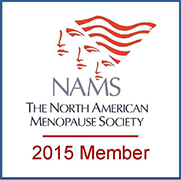Frequently Asked Questions
Hormone Therapy and Breast Cancer risk was addressed in the Menopause and Osteoporosis Update, 2009, Society of Obstetricians and Gynaecologists of Canada. They recognized an increased risk of breast cancer detection after 5 years of estrogen/progesterone therapy. The risk of breast cancer returns to normal shortly after stopping hormone therapy. “The short term use of HT for relief of disruptive vasomotor symptoms (hot flashed/night sweats) carries very little appreciable risk for the average woman entering menopause.”(1).
S.E. Singletary (scientific author) tried to put various breast cancer risk factors into perspective. He noted increased risk rates are about the same for women who:
• Started menstruating before age 12 (early menarche)
• Reached menopause late (after 55)
• Became obese after reaching menopause Delayed their first pregnancy until after 30
• Chose not to breastfeed
• Did not exercise daily (2)
• Consumed excessive alcohol
A recent study, called the E3N cohort study, showed that various forms of HRT have different risks. They found that the type of progester- one makes a difference. 80,377 post-menopausal women were followed for 8.1 years. There were 3,354 cases of cancer. Estrogen plus progesterone, estrogen alone and estrogen plus dydrogesterone had no increase in breast cancer. Estrogen plus other progestagens had a relative risk of 1.69. (3)
You will need to discuss your unique set of risks of breast cancer and benefits of HT with your physician or nurse practitioner. Informed decisions are always the best.
(1) Reid, R.L., Blake,J., Abramson,B., Khan,A., Senikas, V., Forier,M. (2009). Menopause and Osteoporosis Update 2009 [Electronic Version]. Journal of Obstetrics and Gynaecology Canada, 33, S19
(2) Reid, R.L., et al S19
(3) Fournier, A., Berrino, F., Clavel-Chapelon, F. (2007). Unequal risks for breast cancer associated with different hormone replacement therapies: results form the E3N Cohort study. Breast Cancer Research and Treatment (2008) 107:103-111.
Improving Women's Lives Through Better Health in Mid-Life and Beyond


